Survey of English Usage
Annual Report 2023
1. News
1.1 Symposium for Randolph Quirk
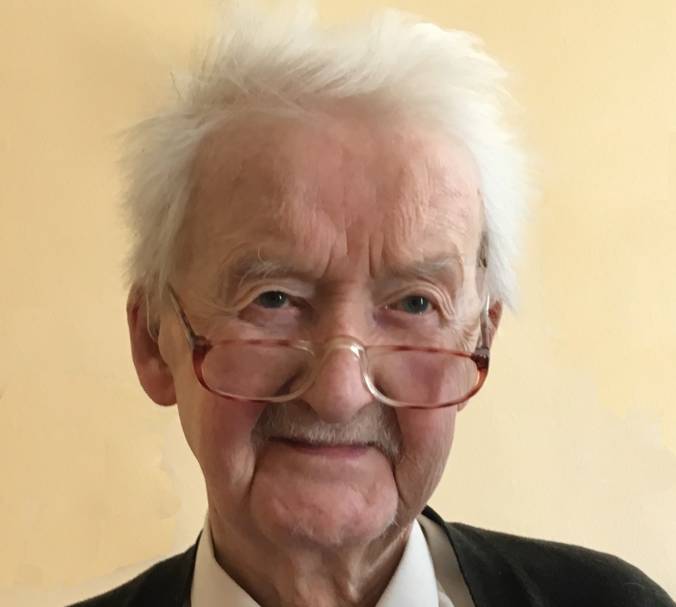 Lord Randolph Quirk founded the Survey of English Usage in Durham in 1959, and moved it to UCL in 1960.
All linguists know Randolph the lead author of the Comprehensive Grammar of the English Language, published in 1985 by Longman, with Sidney Greenbaum, Geoffrey Leech and Jan Svartvik as co-authors. This grammar is one of the standard reference works on contemporary English.
Lord Randolph Quirk founded the Survey of English Usage in Durham in 1959, and moved it to UCL in 1960.
All linguists know Randolph the lead author of the Comprehensive Grammar of the English Language, published in 1985 by Longman, with Sidney Greenbaum, Geoffrey Leech and Jan Svartvik as co-authors. This grammar is one of the standard reference works on contemporary English.
Randolph died on at the age of 97 on 20 December 2017. He left a large legacy to UCL.
Every few years we celebrate his life and achievements, and in 2023 we did so again at a splendid occasion at the British Academy in London.
We held a symposium with the following programme:
- Introductions by Professor Bas Aarts and Professor Stella Bruzzi
- Professor Christian Mair, A Common Language 2.0? Global English 60 Years after Marckwardt & Quirk (1964)
- Professor Emma Moore, More than ‘impoverished language’: viewing grammar as a fluid, flexible social resource
- Dr Guyanne Wilson, Language identities and ideologies on social media: Focus on Caribbean TikTokers
- Panel discussion
More information about the event, and abstracts of talks, are published on our website, where you can also find a biography of Randolph Quirk. There’s a further biography in the Oxford Dictionary of National Biography.



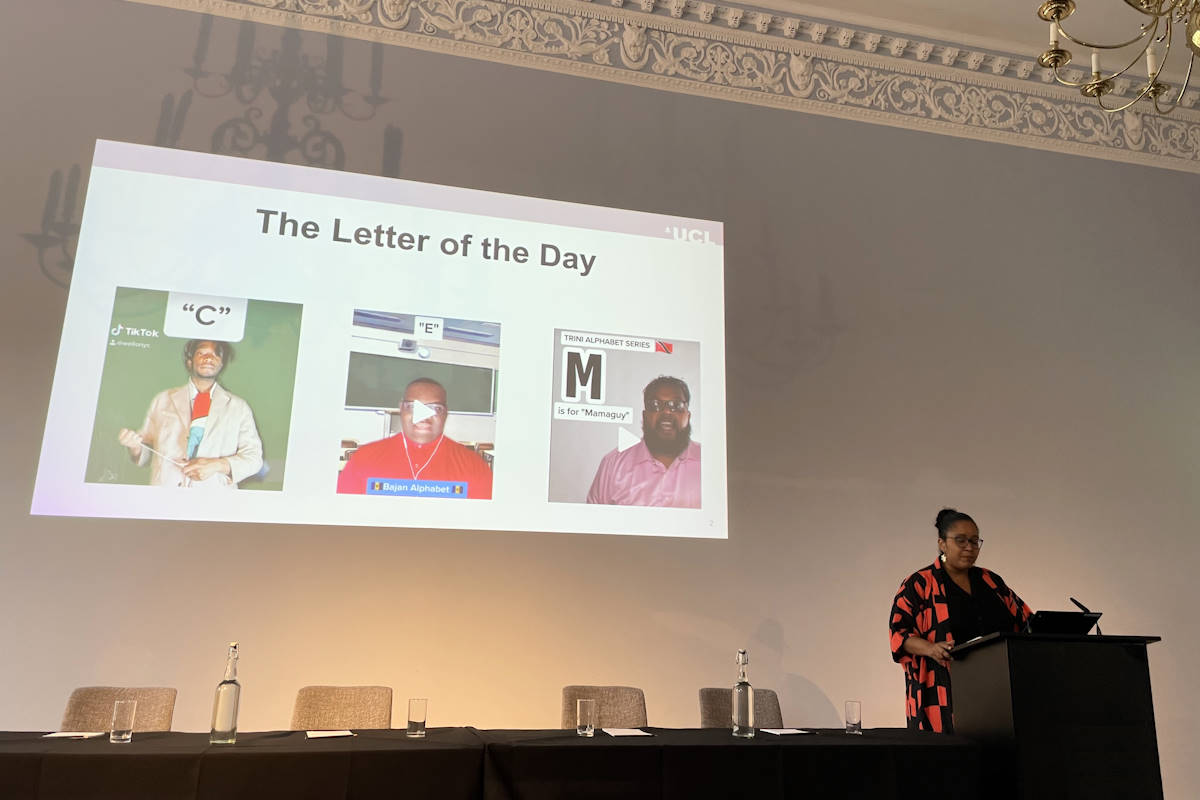
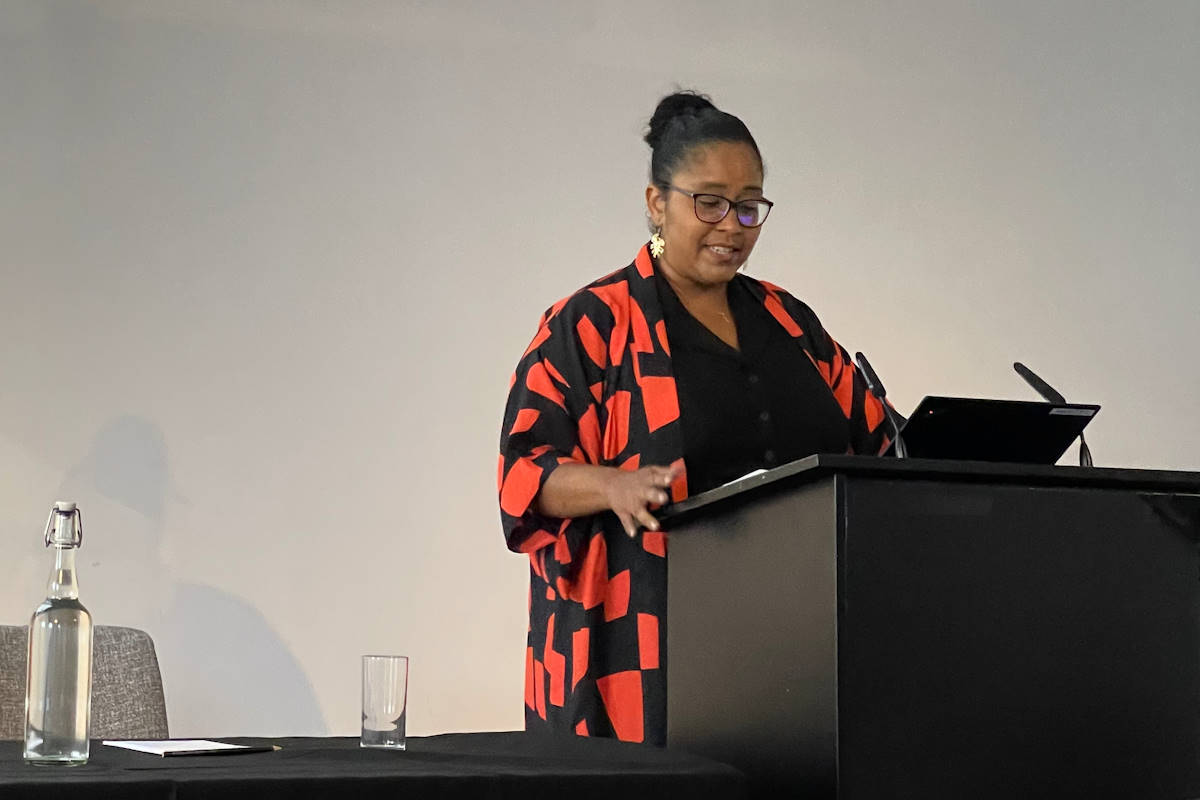
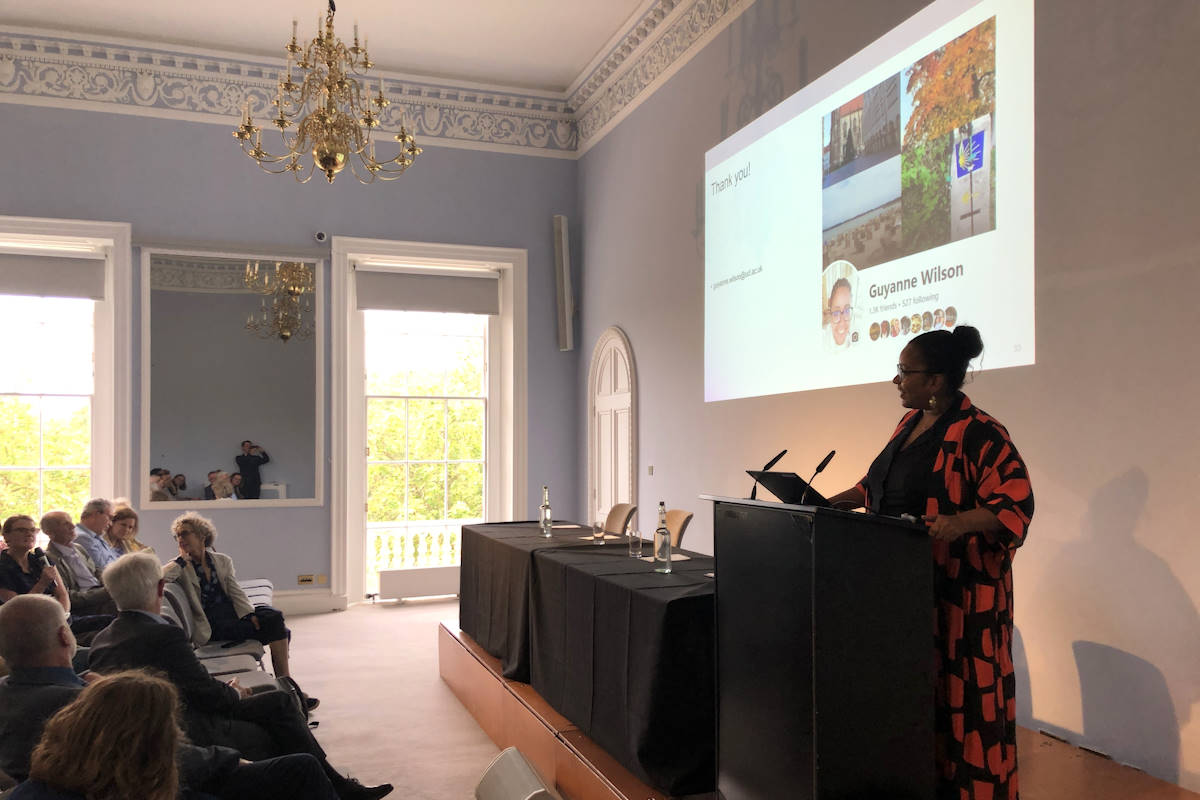

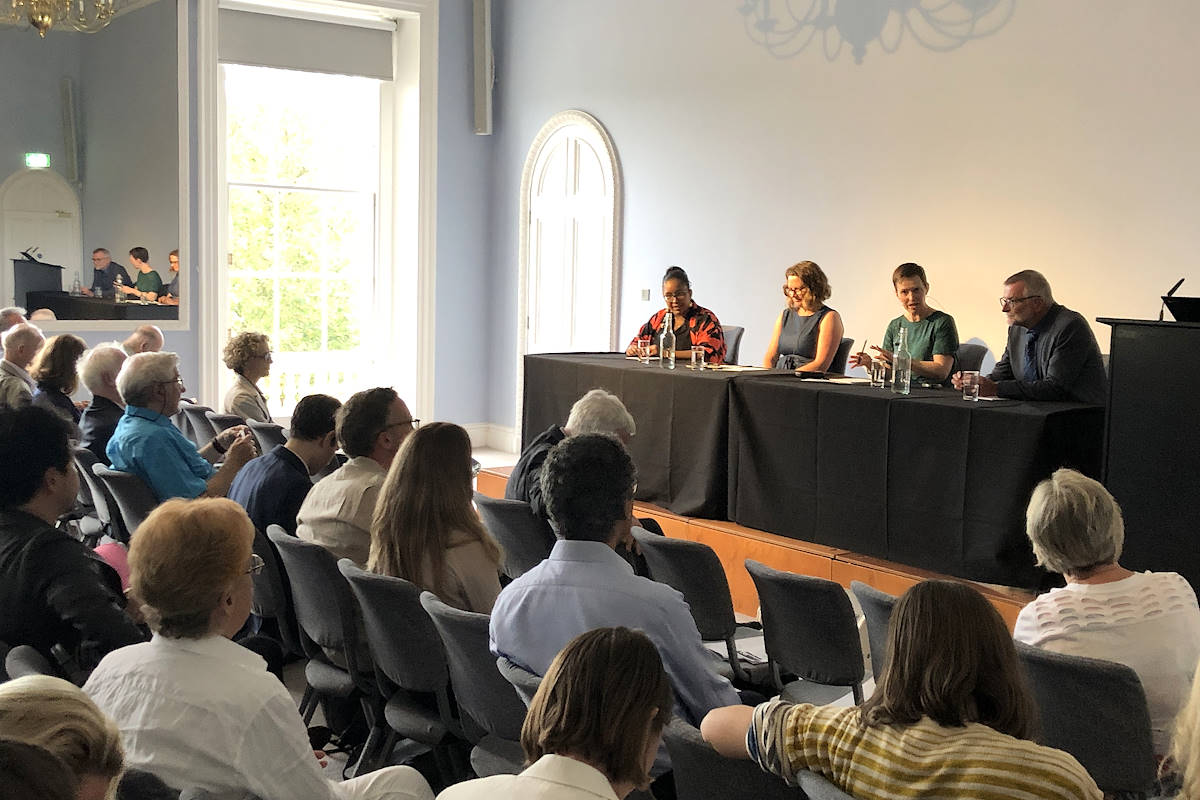
1.2 English Grammar Day 2023






This event was held on Friday 23 June 2023 at UCL. The speakers were:
- Susie Dent (Lexicographer and TV presenter), Word imperfect
- Joanna Gavins (University of Sheffield), Using linguistics to help tackle plastics pollution
- Sylvia Shaw (University of Westminster), Lost in Transcription? The representation of parliamentary speech in writing
- Julia Snell (University of Leeds), Does correcting children’s spoken grammar improve their writing?
- Guyanne Wilson (University College London), Caribbean Englishes in the Standard English debate
- Stephen Dryden (The British Library), They, Them, We, Us
![]() Read the programme and abstracts of the talks
Read the programme and abstracts of the talks
Below are short videos of participants from recent English Grammar Days.
The 2024 English Grammar Day will be back at the British Library (on Friday 28 June 2024).
![]() More information and to book your place
More information and to book your place
2. Research
2.1 Selected research highlights
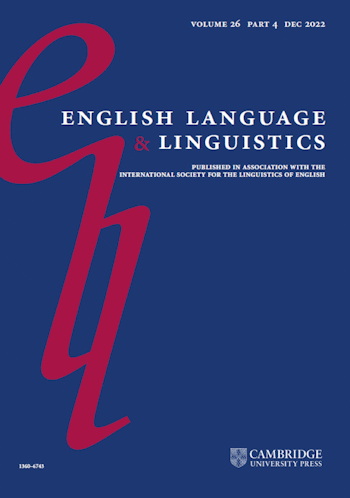 Aarts, B. (2023) ‘Oblique predicative constructions in English with for and as: qua vs. qualitate qua’. English Language and Linguistics, 27.4: 773–788. Open access: https://tinyurl.com/3mcnbkek
Aarts, B. (2023) ‘Oblique predicative constructions in English with for and as: qua vs. qualitate qua’. English Language and Linguistics, 27.4: 773–788. Open access: https://tinyurl.com/3mcnbkek
English has an oblique predicative construction in which the prepositions for and as license an oblique predicative complement that is predicated of a noun phrase, as in We took her for a friend and I regarded her as a genius. The construction with for is the oldest, and is found in many other languages. This paper traces the history of oblique predicative constructions involving for and as, and a number of other prepositions, from Old English to Present-Day English (PDE). Visser (1963–73) has suggested that predicative for and as were rivals, and that in PDE as is now dominant at the expense of for. It is argued instead that since around 1900 predicative for and as can clearly be distinguished semantically as expressing the meanings qua (‘as being’) and qualitate qua (‘in the capacity of’), respectively, and that the existence of these distinct meanings explains why constructions with both prepositions still survive in PDE.
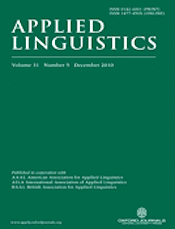 Malory, B. (2023). ‘Polarized discourses of abortion: A corpus-based study of semantic prosody and discursive salience’. Applied Linguistics. https://doi.org/10. 1093/applin/amad042
Malory, B. (2023). ‘Polarized discourses of abortion: A corpus-based study of semantic prosody and discursive salience’. Applied Linguistics. https://doi.org/10. 1093/applin/amad042
With reproductive rights continuing to be a contentious issue globally, questions have been raised about the role language plays in reinforcing stigma around termination of pregnancy. From these questions, language rules have emerged in some domains, meaning that pro-life is discouraged by some ‘pro-choice’ groups and many mainstream media outlets, with anti-abortion recommended instead. By contrast, in official health service documents in the UK, abortion is now avoided totally, in favour of termination of pregnancy, or TOP. A lack of empirical research focused on vocabulary makes it difficult to draw conclusions about the role language, and specifically the word abortion, plays in relation to stigma in this very polarized debate, however. This paper therefore set out to explore whether the stigma associated with abortion may reflect negative semantic prosody, the ‘aura’ or set of cognitive associations prompted by certain words. The paper uses a combination of quantitative corpus linguistic methods and qualitative discourse analysis, and finds that abortion has overwhelmingly unfavourable semantic prosody, or associations, in modern internet English. Moreover, it is often used in extremely negative contexts. The paper therefore proposes the concept of ‘discursive salience’, suggesting that the extremity of anti-abortion discourses makes them more salient than discourses which are favourable, neutral or mixed in their attitude to reproductive rights. The paper therefore combines a contribution to theory around semantic prosody with a practical recommendation that those trying to ‘reclaim’ or de-stigmatize the word abortion should be aware of its possibly unfavourable semantic prosody.
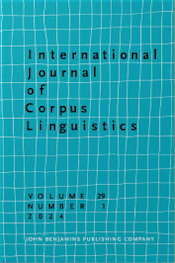 Malory, B. (2023). ‘Pinpointing prescriptive impact: Using change point analysis for the study of prescriptivism at the idiolectal level’. International Journal of Corpus Linguistics. https://doi.org/10. 1075/ijcl.22001.mal
Malory, B. (2023). ‘Pinpointing prescriptive impact: Using change point analysis for the study of prescriptivism at the idiolectal level’. International Journal of Corpus Linguistics. https://doi.org/10. 1075/ijcl.22001.mal
This paper presents a case study of a single author’s writings, which demonstrates how the statistical modelling technique ‘change point analysis’ can be used to investigate language users’ responses to prescriptivism. It has long been suspected that Late Modern English review periodicals had a prescriptive impact on contemporaneous authors whose publications were reviewed, and this paper proves that this was indeed the case for eighteenth- and nineteenth-century novelist, playwright and diarist Frances ‘Fanny’ Burney. Burney’s writings were used to construct a 3-million-word purpose-built corpus spanning 7 decades. Change point modelling was then used to pinpoint a striking change in Burney’s grammar, coinciding with the publication of a scathing prescriptive review of one of her novels. This finding highlights the efficacy of using change point analysis to locate the kind of sudden changes in linguistic behaviour associated with individual exposure to targeted prescriptivism; providing a correlation sophisticated enough to indicate causality.
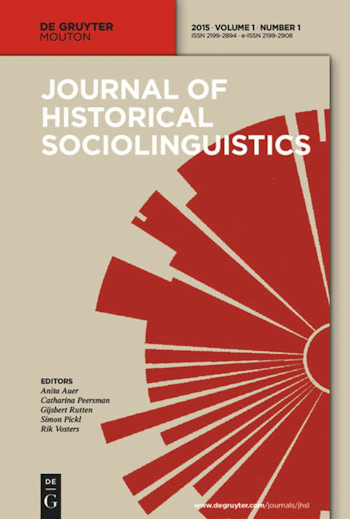 Malory, B. (2023). Locating the ‘Age of Prescriptivism’ in Late Modern periodical reviews: a corpus-assisted discourse analytic approach. Journal of Historical Sociolinguistics 9 (2). https://doi.org/10. 1515/jhsl-2022-0035
Malory, B. (2023). Locating the ‘Age of Prescriptivism’ in Late Modern periodical reviews: a corpus-assisted discourse analytic approach. Journal of Historical Sociolinguistics 9 (2). https://doi.org/10. 1515/jhsl-2022-0035
This paper reports the findings of a study examining prescriptive and normative discourses in Late Modern English review periodicals, using a purpose-built corpus of review articles published between 1750–1899. It uses methods from Corpus-Assisted Discourse Studies to compare 15 sub-corpora, and thereby identifies decades when prescriptive discourses, those which actively attempt to enforce language rules, and normative discourses, those which assume the existence of language rules or standards, were most frequent. This pattern provides empirical evidence of an ‘Age of Prescriptivism’ in periodical reviewing, during which prescriptive discourses seem to reach a peak. Whilst the label ‘Age of Prescriptivism’ has been applied to several periods of English in recent decades, the findings reported in this paper show clearly that the eighteenth century was the locus of prescriptive activity in review periodicals. The innovative application of corpus-based discourse-analytic methodologies for the identification of normative trends reported in this paper could also be used in future to study the effects of prescriptivism in other contexts.
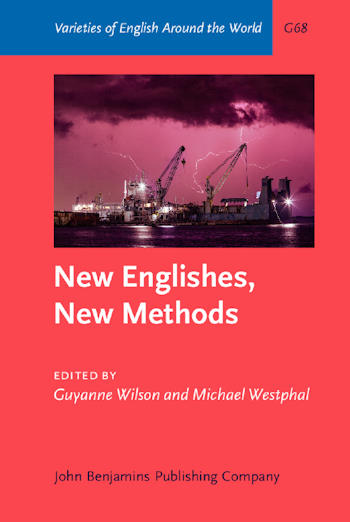 Wilson, G., and M. Westphal (2023). New Englishes, New Methods. Amsterdam: John Benjamins Publishing Company. https://doi.org/10. 1075/veaw.g68
Wilson, G., and M. Westphal (2023). New Englishes, New Methods. Amsterdam: John Benjamins Publishing Company. https://doi.org/10. 1075/veaw.g68
There is an ever-growing body of work on New Englishes, and the time has come to take stock of how research on varieties of English is carried out. The contributions in this volume critically explore the gamut of familiar and unfamiliar methods applied in data collection and analysis in order to improve upon old methods and develop new methods for the study of English around the world. The authors present novel approaches to the use of the International Corpus of English, critical insights into phonological analyses of New Englishes, applications of linguistic dialectology in territories in which New Englishes are used, improvements on attitudinal research, and an array of mixed-methods approaches. The contributions in this volume also include a range of Englishes, considered not only in situ but also in online and diaspora settings, and thus question received understandings of what counts as New Englishes.
Westphal, M. and G. Wilson (2023). ‘Creole and power’. In: G. Wilson, G. and M. Westphal (2023). 86-106.
The paper presents a Critical Discourse Analysis of Jamaican and Trinidadian legal-cross examinations, using data from the International Corpus of English. Although English is the dominant language of the courtroom, the analysis shows that Creole is used by both attorneys and witnesses. In contrast to previous associations of Creole with powerlessness and Standard English with power, attorneys make use of both varieties to exert their authority in the courtroom. Hence, the value of specific linguistic resources and who can use them for which purpose depends on the speakers’ social and institutional positionality. On a methodological level, the paper demonstrates that the International Corpus of English provides valuable data for critical qualitative analyses of language variation in New Englishes.
Wilson, G. and M. Westphal (2023). ‘New Englishes, new methods, new directions’. In: G. Wilson, G. and M. Westphal (2023). 263-274.
This chapter provides an overview of the main findings of the volume and gives some ideas for the future of research and research methodologies in the field.
Wilson, G. (2023) ‘British and American norms in the Trinidadian English lexicon’. World Englishes, 42(1), 73-90.
Previous work on norm orientations in the Caribbean Englishes has focussed largely on phonological norms, such as accents, and, to a lesser extent, grammatical norm orientation. Outside of the publication of dictionaries, however, lexical norms and their spread have received little attention. This paper examines lexical norm orientations in Trinidadian English, presenting the results of a corpus-based study and survey study of the lexical preferences of speakers of Trinidadian English. The findings suggest that while there is evidence of American influence on Trinidadian lexicon, British variants persist. Indeed, British and American variants often coexist, albeit with different connotations in Trinidadian English. From a methodological standpoint, this paper demonstrates the benefits of using a mixed-methods approach in looking at norms, particularly with regard to lexicon.
Wilson, G. (2023) ‘Language use in Peter Ram’s soca performances.’ In: J. Farquharson, A. Hollington and B. Jones, (eds.) Creole Language and Music. Mona: UWI Press. 155-178.
This chapter explores Barbadian soca artiste’s Peter Ram use of Barbadian, Trinidadian and Jamaican Creole English in his soca performances, looking at how this compares to his spoken language, and how features of sung language change over time, and in performances geared towards Barbadian and Trinidadian audiences.
For a full overview of publications, talks etc., see section 6.
2.2 Research grants
Beth Malory was awarded a research grant by the Arts and Humanities Research Council: Engaging Stakeholders to explore linguistic challenges in communicating about pregnancy loss.
She was also awarded a grant by the UCL Research Innovation and Global Engagement for the project Supporting policymakers to negotiate communicative challenges around pregnancy loss: exploring strategies for implementation of an evidence-based approach to policy language.
2.3 Media appearances
Beth Malory was interviewed on More or Less on BBC Radio 4 on 20 February 2023 about how corpus linguistics can show changing trends in grammatical usage. » Listen here.
She was interviewed on the same programme on 4 October 2023 about how many French words are in English, and how we can tell. » Listen here.
An extended version of the above aired on BBC World Service on 7 October 2023. » Listen here.
Bas Aarts appeared on CorpusCast, an informative and entertaining series of interviews with academics working in the field of Corpus Linguistics. If you’ve always wanted to know more about the Survey of English Usage, then listen to this CorpusCast episode in which Robbie interviews Bas Aarts on the history of the Survey and its current projects. » Listen here.
Also worth listening to is Robbie’s interview with Dr Nele Pöldvere (Oslo) and Professor Carita Paradis (Lund) on spoken English in which the exciting London Lund Corpus-2 (LLC-2) is discussed. This is a 500,000-word corpus of spoken British English that matches the LLC-1 Corpus, established at the Survey. » Listen here.
2.4 Symposium on Challenges in Pregnancy Loss Communication
Beth Malory hosted this event at UCL in December 2023, with 15 delegates from around the UK. These included eminent clinicians working in obstetrics and gynaecology, including Professor Alex Heazell, Director of the National Stillbirth Research Centre, Professor Siobhan Quenby from the National Centre for Miscarriage Research, and Rachel Small, Chair of the Association of Early Pregnancy Units, as well as representatives of project partner organizations Tommy’s and Sands, and collaborators Antenatal Results and Choices, The Ectopic Pregnancy Trust, and Petals.
At the Symposium, the challenges for clinicians and charities of communicating about pregnancy loss were discussed, with a focus on terminology and the lack of a standardized, sensitive and appropriate set of words for discussing experiences of gestational bereavement.
2.5 Keywords project
In July 2023 Kathryn organised a small workshop, held at UCL’s Institute of Advanced Studies for the Keywords Project, where each member of the group presented an entry for a keyword. This was attended by Jonathan Arac (University of Pittsburgh), Colin MacCabe (University of Pittsburgh), Seth Mehl (University of Sheffield) and Holly Yanacek (James Madison University). Some of the material that was presented will be published in future issues of Critical Quarterly.
2.6 Survey seminars
Survey seminars are occasions when staff and students at the Survey of English Usage invite scholars to share their research outputs. The seminars are open to everyone, and are announced on the Events page on our website. The following research seminars took place during 2023:
8 February, Guyanne Wilson, University College London, Indexicality, enregisterment and identity on social media: Focus on Caribbean TikTokers
In the Caribbean, where English-lexicon Creoles are spoken alongside local varieties of Standard English, Creole use has long been viewed as an overt marker of local identity (e.g. Le Page and Tabouret-Keller, Shields-Brodber 1997, Youssef 2004). However, less is known about the mechanisms through which speakers make use of Creole forms and how exactly identity is performed in interaction. In this presentation, I apply the concepts of indexical order (Silverstein 2003, Johnstone and Kiesling 2008) and enregisterment (Agha 2006) to a series of videos called the Caribbean Alphabet Series produced by TikTokers from Barbados, Guyana, and Trinidad and Tobago. The TikTokers draw on widely known lexical items — third order indexes — to perform their identities as authentic, knowledgeable speakers of their respective varieties, and thereby contribute to the ongoing process of enregistering these features as typical of those varieties. However, the speakers also make use of first and second order indexes, which allow them to do more subtle identity work throughout the videos.
26 October, Andy Gibson, Queen Mary University of London, Singing how singers sing: Pop Song English as a supralocal norm
We are neither automatons nor untrammelled agents when it comes to sociolinguistic style. The sung voices of popular music exemplify this ever-present tension between convention and innovation, between belonging and branching out.
Pop Song English (PSE) is a supralocal norm that, despite being based on the phonology of American Englishes, is performed in Anglophone music around the world. It has been conventionalised and focused over the last six or so decades, and despite its likely origins in intentional stylisation (as evidenced by instances of overshoot), it has become the default style for singing pop songs. While cases of ‘own-accent’ singing attract attention, their salience is in part due to the unmarkedness of PSE.
In a corpus of 154 artists, structured according to country of origin (NZ and USA) and musical genre (pop and hip hop), auditory analysis of BATH vowels and nonprevocalic /r/, and acoustic analysis of LOT vowels reveal greater homogeneity in pop than hip hop, and show how closely NZ pop singers align with their US counterparts. Against this backdrop of conformity, artists who wish to ‘sing the way they speak’ may do so with conscious intent, effectively stylising their own spoken voice in the context of song.
The formation of new musical genres involves a range of stylistic innovations that sometimes include the development of singing accents that break away from PSE. In this way, musical genre (rather than geographic origin of a singer) becomes the primary predictor of singing accent.
Moving from the sociolinguistic to the psycholinguistic, I argue that PSE is not restricted to performers per se. The results of two perception experiments suggest that, in the New Zealand context, the music-listening public undergo a perceptual style shift when expecting to hear a sung voice. They categorise phonemes according to a more American-like phonological frame of reference, and process words more quickly in a US than a NZ voice in a musical context. Singing and speech constitute sufficiently distinct domains to support a kind of bidialectalism for listeners and singers alike.
12 December, Luke Pearce, University College London, The Englicious project: A decade of grammar in the curriculum
In 2014, then Education Secretary Michael Gove led education reforms that included the reintroduction of explicit knowledge of English grammar in the National Curriculum for the first time in half a century. Over the last decade, the Englicious project, based in the Survey of English Usage at UCL, has produced resources aimed at helping pupils, teachers, and parents with these new requirements. These include the free website englicious.org as well as classroom materials and training sessions for school staff.
The inclusion of grammar, especially the testing at primary level and some new terminology, has proven to be persistently controversial, epitomised in the press and social media bugbear, the ‘fronted adverbial’. This talk will cover the recent history of grammar in the curriculum, and discuss how the Englicious project has helped teachers gain a better understanding of grammar pedagogy.
Keep an eye on the Survey website for our 2024 talks!
 3. Software: ICECUP
3. Software: ICECUP
ICECUP is our state-of-art corpus exploration platform for parsed corpora developed by Sean Wallis. The very latest version of ICECUP 3.1.1 is available from our website including sample corpora from either DCPSE or ICE-GB, and of course is distributed with our full corpora. The software is compatible with Windows computers from XP to 11, and 32 and 64 bit Windows, and can be run on Windows Servers and Macs using emulator software.
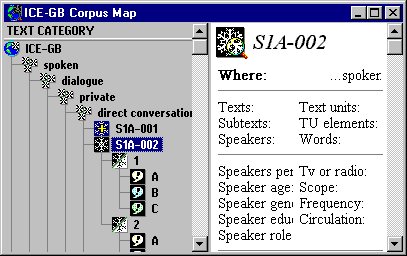
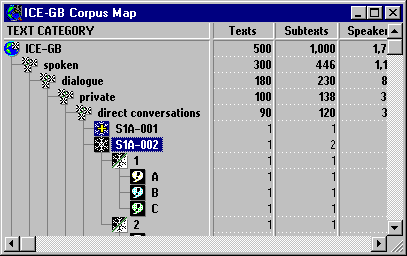
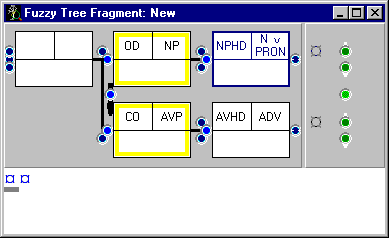
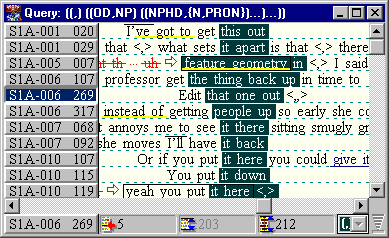
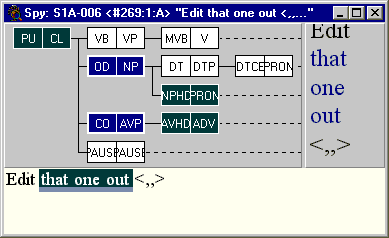
In his 2021 book, Statistics in Corpus Linguistics Research, Sean showed how researchers may use ICECUP and the parse analysis to:
- frame or narrow research questions, specifying a specific grammatical context for a linguistic event, X,
- explore lexical-grammatical permutations and variables (explore a set of events X comprising subcategories x1, x2, etc.), and
- relate neighbouring linguistic events (e.g. where event X is a conjoin just before another event Y, Y is a component of X, etc).
ICECUP continues to be maintained and developed, although we do not publish non-critical updates.
4. Teaching
4.1 Summer School in English Corpus Linguistics
Our tenth Summer School in English Corpus Linguistics took place online from Monday 19 to Wednesday 21 June 2023, and featured our new colleague Beth!
We had over seventy attendees from some twenty-five countries, including a large group from Japan. This event was timed to allow everyone from Europe to Japan to attend.
This year’s Summer School will take place from Monday 1 to Wednesday 3 July 2024. Beth and Guyanne will join Bas and Sean and the new programme will also include a session on World Englishes.
![]() More information and how to book
More information and how to book
4.2 The Englicious project and Continuous Professional Development courses
The Englicious project is continually being enhanced with new functionality and resources.
In 2023 we added new resources on genre, written by Professor Andrew Goatly.
This series of eight lessons covers both the analysis and writing of texts across a range of genres. Learners will read and create texts such as encyclopaedia entries, newspaper articles and narratives, focussing on how particular grammatical structures contribute to the desired effects. The lessons are designed so that grammar is taught through ‘meaning-making’ in a variety of social contexts, and will also help learners enhance their critical thinking about the purposes of different genres. These lessons all come with a step-by-step lesson plan, are consistent with the National Curriculum terminology and use a variety of interactive elements like mix-and-match activities and True/False quizzes.
If you haven’t yet heard of Englicious, here’s some information about the site:
What is Englicious?
- an entirely free online library of original English language teaching resources, especially grammar.
- closely tailored to the linguistic content of 2014 National Curriculum for England
- relevant for students and teachers at Key Stages 1-5.
- includes grammar, punctuation and spelling test practice material.
- uses examples from natural language corpora.
 Englicious
will help students:
Englicious
will help students:
- learn about English grammar in a fun way, using interactive online resources, including exercises, projects and games, all of which can be projected onto an interactive whiteboard
- develop their literacy skills, with a focus on spelling, punctuation and writing
- stimulate their enjoyment of (using) language, both in spoken and written form
- enhance their confidence
- improve their test scores, especially the Year 2 and Year 6 Grammar, Punctuation and Spelling tests in UK schools
Englicious offers teachers:
- year-by-year overview of the new programmes of study and attainment targets in the 2014 UK National Curriculum
- hundreds of fully prepared lesson plans, including everything from bite-sized starters to larger projects, for use in the classroom
- assessments for evaluating student attainment and progress
- a complete and rigorous overview of English grammar
- the entire 2014 National Curriculum Glossary, enhanced with new terminology enabling teachers to use terminology consistently throughout the Key Stages
- professional development materials for teachers to brush up on their own knowledge
4.3 Continuous Professional Development courses
The Survey offers online Continuous Professional Development courses to teachers in primary and secondary schools who need to teach the requirements for grammar, punctuation and spelling in the National Curriculum for England. We teach this course online and in schools.
- English Grammar for Teachers: a subject knowledge course covering the fundamentals of National Curriculum English grammar, relevant for KS1-5 teachers.
- Teaching English Grammar in Context: a course for KS3-5 teachers, where we explore methods, tools and approaches for teaching grammar in relation to literary and other texts.
The Survey also offers bespoke courses for teachers in schools (INSET courses). For example, in January 2023, Bas Aarts and Luke Pearce taught English Grammar for Teachers at the Evelina Children’s Hospital in London. For more information, email the Survey.
![]() More information, and how to book
More information, and how to book
![]() English Grammar for Teachers and Teaching English Grammar in Context are also available on FutureLearn, an online course platform. Newly available on the same platform is a grammar course aimed at the general public, called English Grammar: All You Need to Know.
English Grammar for Teachers and Teaching English Grammar in Context are also available on FutureLearn, an online course platform. Newly available on the same platform is a grammar course aimed at the general public, called English Grammar: All You Need to Know.
4.3 MA in English Linguistics
Most Survey colleagues teach on the MA in English Linguistics (with pathways in ‘English Corpus Linguistics’ and ‘English in Use’) which attracts students from all over the world.
Our graduates have gone on to PhD scholarships in the UK and abroad, as well as careers in teaching, publishing, and public relations.
5. Social Media
The Survey has three blogs:
- Bas Aarts’s Grammarianism blog.
- Sean Wallis’s corp.ling.stats blog.
- And the Survey blog.
You can follow us on X (Twitter) via @UCLEnglishUsage and @EngliciousUCL.


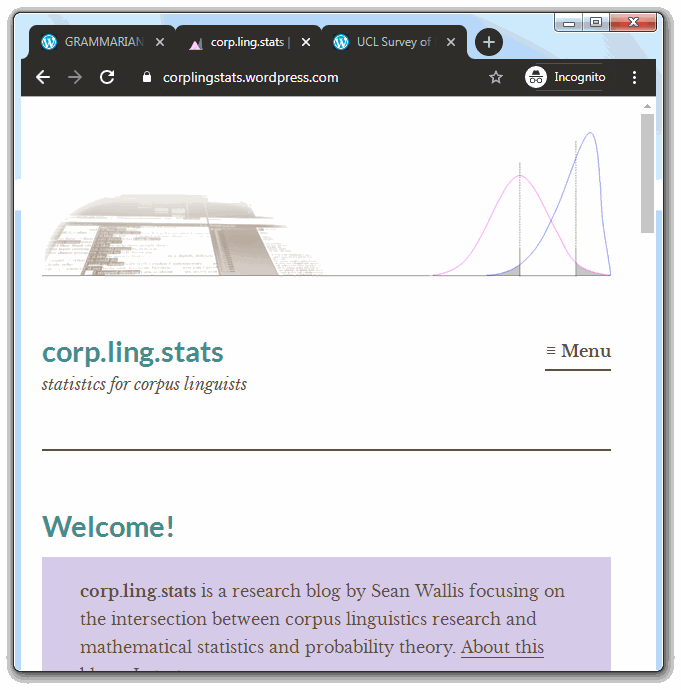

6. Publications, conference presentations, talks, dissertations and other studies using Survey material
Please let us know if you would like us to include your publications based on SEU material. We would appreciate it if you send us offprints of any such publications.
Aarts, B. (2023) ‘Oblique predicative constructions in English with for and as: qua vs. qualitate qua’. English Language and Linguistics, 27.4: 773–788. » https://tinyurl.com/3mcnbkek (Open access).
Aarts, B. (2023) ‘Review of Rodney Huddleston, Geoffrey K. Pullum and Brett Reynolds, A student’s introduction to English grammar, 2nd edition’. Cambridge: Cambridge University Press. English Language and Linguistics 27.3. 2023, 633-640.
Aarts, B. (2023) ‘The teaching of grammar and its impact on young children’s writing: presenting the results of a randomized controlled trial and qualitative implementation and process evaluation using the resources of the Englicious website’. (With Sue Sing.) Paper presented at IV Congrés Internacional sobre l’Ensenyament de la Gramàtica (Congram23), Valencia, Spain.
Aarts, B. and S. Sing (2023) ‘Englicious in the primary classroom: teachers’ experiences of using a play-based intervention to support Year 2 children’s understanding of grammar’. Published online, Impact. » https://tinyurl.com/27h5p63f.
Aarts, B. (2023) ‘Who needs Standard English?’ Focus Paper for the Chartered Institute of Editing and Proofreading. » e-Published.
Allan, K. (2023) ‘Antonymy, markedness, and rates of lexicalization’. Conference presentation at the 22nd International Conference for English Historical Linguistics (ICEHL 22) in Sheffield.
Allan, K. (2023) ‘Exploring the lexicalization of antonyms in the history of English’ Invited presentation at the University of Zurich in the series ‘Variation and change in the history of English’. » Watch online.
Mair, C. (2023) ‘A common language 2.0? Global English 60 years after Marckwardt and Quirk (1964)’ Presentation at the symposium in honour of Randolph Quirk, British Academy, London (see above).
Malory, B. (2023) ‘Pinpointing prescriptive impact: using change point analysis for the study of prescriptivism at the idiolectal level’. International Journal of Corpus Linguistics. https://doi.org/10.1075/ijcl.22001.mal
Malory, B. (2023) ‘Locating the ‘Age of Prescriptivism’ in Late Modern periodical reviews: a corpus-assisted discourse analytic approach’. Journal of Historical Sociolinguistics 9.2. https://doi.org/10.1515/jhsl-2022-0035
Malory, B. (2023) ‘Polarized discourses of abortion in English: using corpora to explore semantic prosody and discursive salience’. Department of English Language, TESOL and Applied Linguistics, Swansea University and at the UCL Health Communication Network.
Malory, B. (2023) ‘Towards operationalization of the concept of discursive salience as a factor in the development of semantic prosody: the case of abortion in English Web 2020.’ Corpus Linguistics 2023 (CL2023), Lancaster University.
Malory, B. (2023) ‘Tackling medical misogyny by implementing lexical reforms with language guidance: the view from the UK obstetrics and gynaecology sector’. 12th International Gender and Language Association biennial conference (IGALA12), University of Queensland.
Malory, B. (2023) ‘A lexicon of relics: Tracing the diachronic evolution of diagnostic terminology in obstetrics and gynaecology’. Department of English Language and Linguistics, University of Glasgow.
Malory, B. (2023) ‘Challenges in communicating about pregnancy loss: the evidence to date’. Presentation at the First Symposium on Challenges in Communicating about Pregnancy Loss, Department of English Language and Literature, UCL.
Pearce, L. (2023) ‘The Englicious project: a decade of grammar in the curriculum’. Presentation at the Survey of English Usage Research Seminar series.
Sing, S. and B. Aarts (2023) ‘Englicious in the primary classroom: teachers’ experiences of using a play-based intervention to support Year 2 children’s understanding of grammar’. Published online, Impact. » https://tinyurl.com/27h5p63f.
Westphal, M. and G. Wilson (2023). ‘Creole and power’. In: G. Wilson, G. and M. Westphal (2023). 86-106.
Wilson, G. and M. Westphal, M. (2023). New Englishes new methods. Amsterdam: John Benjamins Publishing Company.
Wilson, G. and M. Westphal (2023). ‘New Englishes, new methods, new directions’. In: G. Wilson, G. and M. Westphal (2023). 263-274.
Wilson, G. (2023) ‘British and American norms in the Trinidadian English lexicon’. World Englishes, 42(1), 73-90. https://doi.org/10.1111/weng.12609
Wilson, G. (2023) ‘Language use in Peter Ram’s soca performances. In: J. Farquharson, A. Hollington and B. Jones, (eds.) Creole Language and Music. Mona: UWI Press. 155-178.
Wilson, G. (2023) ‘Review of Pam Peters and Kate Burridge (eds.), Exploring the ecology of World Englishes in the twenty-first century: Language, society and culture. Edinburgh: Edinburgh University Press, 2021. English Language & Linguistics, 27(2), 396-402.
Wilson, G. (2023) ‘Identity, indexicality, and enregisterment on social media: focus on Caribbean TikTokers (Trinidad). Presentation at the Survey of English Usage.
Wilson, G. (2023) ‘The Black Atlantic at 30: Revival and Erasure’. Presentation at the UCL Sarah Parker Remond Centre.
Wilson, G. (2023) ‘Wholesome and godly exhortations: language and power in The Books of Homilies. Presentation at the UCL English Department research seminar.
Wilson, G. (2023) ‘Language ideologies and social disadvantage’. Presentation at the University of Syracuse London Campus.
Wilson, G. (2023) ‘Language ideologies and identities on Facebook and TikTok: a southern Caribbean perspective’. Presentation at the University of Westminster, Sociolinguistics Talks.
Wilson, G. (2023) ‘Language identities and ideologies on social media: focus on Caribbean TikTokers. Presentation at the symposium in honour of Randolph Quirk, British Academy, London (see above). Also at the University of Sussex Research on Language and Linguistics seminar series and at the International Association of World Englishes Conference, New York.
Wilson, G. (2023) ‘Speech Acts by Trinidadian Influencers on TikTok’. Presentation at Pragmatic Variation in World Englishes, Münster, Germany.
Wilson, G. (2023) ‘Language and the Black Atlantic. Talk at St Joseph’s Convent, Port-of-Spain, Trinidad.
Wilson, G. (2023) ‘Caribbean Englishes in the Standard English debate. Presentation at the English Grammar Day, UCL. (See above)
Bas Aarts
Director
January 2024
This page last modified 17 February, 2023 by Survey Web Administrator.